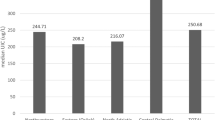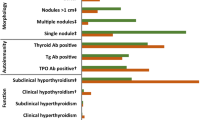Abstract
Objectives: The aim of this project was to assess the clinical significance of our low iodine excretions in terms of thyroid hormone status and thyroid volume in an adult population in a low soil iodine area of the South Island of New Zealand.
Design and setting: Two-hundred and thirty-three residents of Otago, New Zealand collected two 24 h urine samples for assessment of iodine status. Thyroid status was determined from serum total T4, TSH and thyroglobulin, and thyroid volumes. Relationships between urinary iodide excretion and measures of thyroid status were determined and subjects were allocated to one of three groups according to low, medium and high iodide excretion, for comparison of thyroid hormones and thyroid volumes.
Results: Significant correlations were found for relationships between measures of urinary iodide excretion and thyroid volume and thyroglobulin. Multiple regression analysis of data for subjects divided into three groups according to 24 h urinary iodide excretion (<60, 60–90; >90 μg iodide/day) or iodide/creatinine ratio (<40; 40–60; >60 μg/g Cr) showed significant differences in thyroid volume (P=0.029; P=0.035, respectively) and thyroglobulin (P=0.019; P=0.005, respectively) among the groups.
Conclusions: The results of this study confirm the low iodide excretions of Otago residents, and indicate that the fall in iodine status is being reflected in clinical measures of thyroid status, including enlarged thyroid glands and elevated thyroglobulin. Our observations suggest the possible re-emergence of mild iodine deficiency and goitres in New Zealand. This situation is likely to worsen should iodine intakes continue to fall and continued monitoring of the situation is imperative.
Sponsorship: Health Research Council of New Zealand
European Journal of Clinical Nutrition (2001) 55, 387–392
This is a preview of subscription content, access via your institution
Access options
Subscribe to this journal
Receive 12 print issues and online access
$259.00 per year
only $21.58 per issue
Buy this article
- Purchase on Springer Link
- Instant access to full article PDF
Prices may be subject to local taxes which are calculated during checkout
Similar content being viewed by others
Author information
Authors and Affiliations
Contributions
Guarantor: CD Thomson.
Contributors: CDT designed and supervised the study, carried out statistical analysis and wrote the paper. SW carried out recruitment and management of subjects. AJC assisted with recruitment and thyroid hormone analyses. JJ carried out iodine and creatinine analyses and assisted with thyroid hormone analyses. TCD carried out all thyroid volume measurements.
Corresponding author
Rights and permissions
About this article
Cite this article
Thomson, C., Woodruffe, S., Colls, A. et al. Urinary iodine and thyroid status of New Zealand residents. Eur J Clin Nutr 55, 387–392 (2001). https://doi.org/10.1038/sj.ejcn.1601170
Received:
Revised:
Accepted:
Published:
Issue Date:
DOI: https://doi.org/10.1038/sj.ejcn.1601170
Keywords
This article is cited by
-
Continuously sustained elimination of iodine deficiency: a quarter of a century success in the Islamic Republic of Iran
Journal of Endocrinological Investigation (2018)
-
Urinary iodine concentration of New Zealand adults improves with mandatory fortification of bread with iodised salt but not to predicted levels
European Journal of Nutrition (2016)



